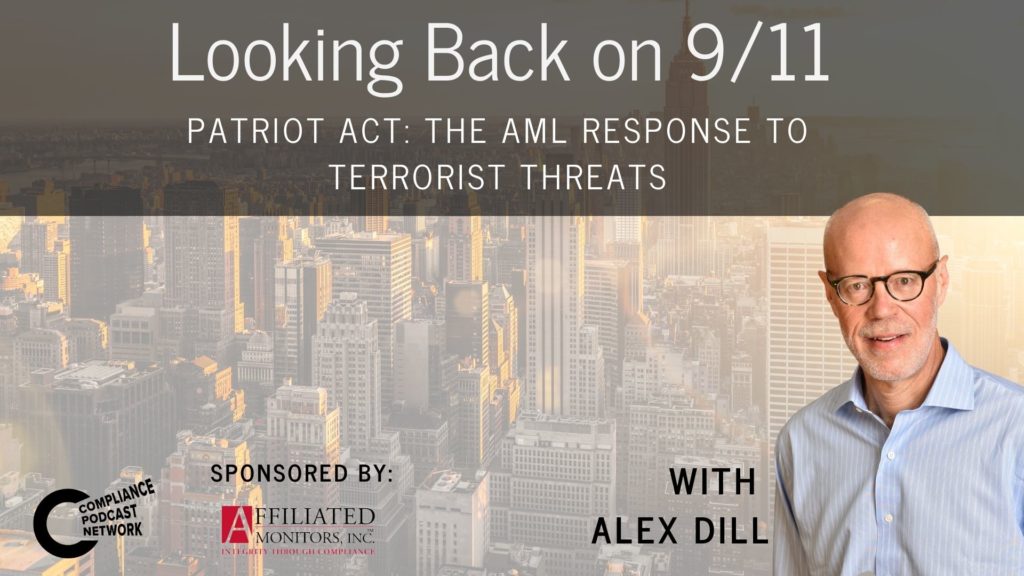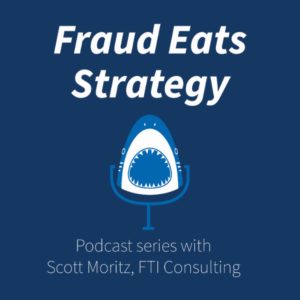
This coming Saturday is the 20th anniversary of the attacks upon America on September 11, 2001. Like most Americans, this was the seminal event in the history of our country. I have been thinking a lot about that date and the anniversary; even more so with the fall of Afghanistan and the evacuation from Kabul. I wanted to do something to commemorate this anniversary, so I decided to do a podcast series featuring the personal stories of persons in the compliance field with their thoughts about what the date of 9/11 means to them, how it changed our profession and their thoughts looking back some 20 years later. The lineup for this week is:
- 6 – Gabe Hidalgo
- 7 – Juan Zarate
- 8 – Alex Dill
- 9 – Eric Feldman
- 10 – Scott Moritz
- 11 – John Lee Dumas
My guest today is Professor Alexander Dill. Professor Dill is a scholar specializing in financial regulation, risk management and compliance. He also has corporate experience in the ethics of business practices in finance, bankruptcy, bond covenants, and debt markets. He joined me to talk about The Patriot Act’s impact on responding to terrorist threats. On 9/11, he worked in lower Manhattan.
He recalled Tuesday, September 11, 2001, was a beautiful Tuesday morning. When he got out at his subway stop for work there was a big crowd of people and they were talking about a single engine Cessna, which had accidentally hit the North Tower. That turned out not to be true. He never did make it in his building. He solemnly said, “I think I was lucky because there were people in the corner office watching people as they jumped out of the top floors. I looked down in the ground at a street corner and I saw an engine from one of the American airlines planes which I later saw in the 9/11 Museum.” He saw the South Tower collapse and he related, “I was frozen in my tracks, I just couldn’t move. Then an EMS worker was running up the street and yelled at me, get moving. There was a big cloud of dust chasing her. So, I did finally did start running.”
Dill said that prior to 9/11, anti-money laundering (AML) regulations were very lax and backward looking. The focus was on prosecuting crimes that were already committed, and prosecuting money laundering, more so than the financing of terrorism. Banks were not engaging in meaningful customer due diligence as they felt the process invasive. After 9/11, this all changed. Law enforcement agencies and financial institutions revamped their policies and procedures to take a more preventive approach to AML and financing of terrorism.
Financial institutions also changed their attitudes. Banks had previously considered customer due diligence to be overly invasive in the business model. Whether it was in deposit taking, wire transfers or payouts, they resisted meaningful customer due diligence. All that resistance crumbled in the wake of 9/11. These became the core attributes of the Patriot Act, as federal authorities had long wanted to introduce meaningful customer due diligence and they were finally able to do so in the form of the Patriot Act, which had strong, bi-partisan support. It was this desire for a more preventative, proactive approach led to the Patriot Act.
We also considered the similar regulatory response with non-financial institutions with respect to the Patriot Act AML procedures post-9/11. Dill said, “There was a huge amount of rulemaking that had to be done.” He added that public companies adopted customer due diligence, and that it was applied more broadly applied to different sectors, but with a risk-based approach. Companies now had to file suspicious activity reports, not just banks. Customer identification was also introduced. “The Patriot Act sought to encourage cooperation among law enforcement agencies, and among the financial institutions themselves to share information and obtain information from foreign law enforcement authorities.”
Yet even with the Patriot Act there are still challenges. A key challenge is detecting the financing that goes into these attacks. Funds that finance these actions are sourced from both legal and illegal means, and that is a major issue. This brought other sectors within the ambit of the Patriot Act. Dill said, “they brought in broker dealers, what I call the capital markets from broker dealers, mutual funds and the futures industry, pool operators, commodity brokers, and so on. A customer identification program was introduced. Another problem is trying to prevent future terrorist acts, which complicates design of a system for detection and prevention. Of course, firms also rely on the government’s list of known and suspected terrorists. Finally, is the basis of a risk-based approach, which is usually the transaction amount. Many terrorist-based transactions are relatively small, and this might pose a risk to some compliance officers.”
I concluded by asking Dill to reflect back on what the last 20 years had brought to the world of AML and compliance. His view is that the advent of technology has been the key in AML and the terrorism financing fight, in AML and terrorism financing regulation and in AML and terrorism financing compliance. But technology advances are much broader than simply in combating terrorist financial. Dill pointed to social media which he said has a “creative and productive side, but also kind of a dark side or a negative side.” Cryptocurrency has expanded investment opportunities if you want to get into that value title asset class, “but it is also increasingly used by criminals for money laundering and financing of terrorism.” Finally, there is “AI and machine learning, where this tech can offer very efficient compliance solutions, but the models are often black boxes. They can’t be properly validated, and this increases model risk.” Dill ended with the Anti-Money Laundering Act of 2020, which he said, “really does a good job of enhancing, attempting to enhance innovative technologies to help achieve the law enforcement objective.”
Please check out each of the podcasts this week. They will post at 6 AM CT on the Compliance Podcast Network and JDSupra and midnight on Innovation in Compliance, YouTube, iTunes and Spotify. Tomorrow Eric Feldman will join me to discuss the change in an Inspector General’s (IG’s) role in the wake of 9/11.









